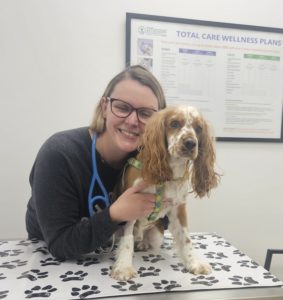 There is nothing more adorable than playful, fluffy puppies and kittens. Whether searching for a pet through a shelter, pet store or breeder, the reality is that most people seeking to become pet parents look for young animals. During National Senior Pet Month, the team at Total Veterinary Care® encourages you to look beyond the “cute” factor and consider the joys of adopting a senior pet! According to the petnet blog, a pet is considered to be senior when they are “over the age of 10-12 for a cat, and for a dog, it may be 11 years for a small dog like a Chihuahua or as young as 5-6 for an extra-large breed like a Great Dane.”
There is nothing more adorable than playful, fluffy puppies and kittens. Whether searching for a pet through a shelter, pet store or breeder, the reality is that most people seeking to become pet parents look for young animals. During National Senior Pet Month, the team at Total Veterinary Care® encourages you to look beyond the “cute” factor and consider the joys of adopting a senior pet! According to the petnet blog, a pet is considered to be senior when they are “over the age of 10-12 for a cat, and for a dog, it may be 11 years for a small dog like a Chihuahua or as young as 5-6 for an extra-large breed like a Great Dane.”
According to a dogtime.com blog, “[i]n many cases, the absolute most difficult group of homeless pets to place [is] older dogs and cats.” It is troubling that senior pets are likely to spend the longest amount of time at a shelter or rescue before finding their forever homes, they have higher euthanasia rates than their younger counterparts, and they might have to live the rest of their lives out in a shelter.
But what joy a senior pet can bring to a new home! A little gray fur around their eyes or face does not necessarily mean their best years are behind them. Many senior pets can enjoy a happy and active lifestyle just as much as they enjoy curling up with you on the couch to binge-watch your favorite TV series. They are more likely to have been a part of a previous family, so they may have already had some training and might not require the extensive (and sometimes exhausting and expensive) training of a young pet. And senior pet adoptive owners often report that their new pet seems extra appreciative of coming to a new home.
One special challenge of adopting a senior pet can be that they have established habits and patterns. Before adopting a senior pet (or any pet, for that matter), spend time to make sure the pet is a good fit for your family. Health challenges can also be greater in a senior pet, but regular veterinary care — including dental and preventive care such as blood work — can help insure that they keep their good health.
At Total Veterinary Care®, we recommend biannual Preventive Care Examinations so that we can help you identify and manage any special geriatric health care concerns. Our Total Care Wellness Plans® can help you budget for special costs associated with senior care. Our goal is to keep your best friend as healthy as possible by minimizing aging issues than can affect their health and well-being.
We encourage you to save a life and adopt a senior pet! You’ll be thankful you did…and so will they!






